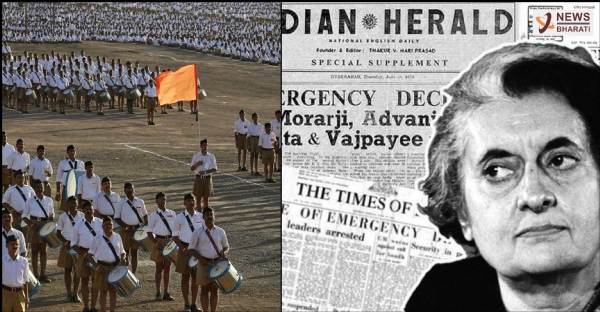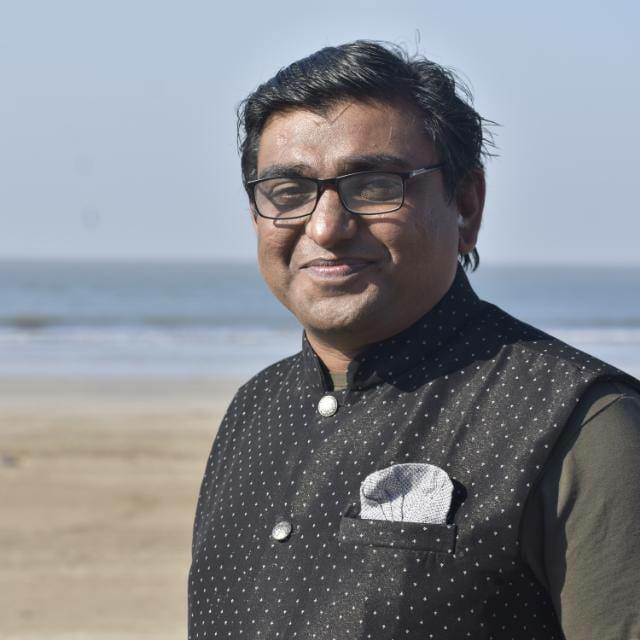Emergency and Rashtriya Swayamsevak Sangh
During the Emergency, 100 Rashtriya Swayamsevak Sangh workers were sacrificed, most in captivity and some outside. Shri Pandurang Kshirsagar, the head of the Sangh"s All India Management team, was among them.
Total Views |
On June 20, 1975, the Congress held a massive rally at which Devkant Barua declared, "Indira Teri Subah Ki Jai, Teri Sham Ki Jai, Tere Kaam Ki Jai, Tere Naam Ki Jai," and during this public meeting Indira Gandhi stated during her speech that she would not resign as Prime Minister.

On June 25, 1975, in front of a large crowd at Ramlila Maidan, Jayaprakash Narayan stated, "All opposing sides should unite for the sake of the country, otherwise dictatorship will be established here and the people will be unhappy." "After this, meetings will be held in villages demanding Indiraji's resignation, and daily satyagraha will be held in front of the President's residence from June 29," said Nanaji Deshmukh, secretary of the Lok Sangharsh Samiti. On the same evening, as thousands of people returned from the massive public meeting at Ramlila Maidan, it seemed as if the demand from every corner was that "the Prime Minister resign and follow the tradition of a true republic." (P.G. Sahasrabuddhe, Manikchandra Bajpai, Emergency Struggle Story (1975–1977), p. 1)
Rashtriya Swayamsevak Sangh and Emergency
On the 15th and 16th of March 1975, the Deendayal Shodh Sansthan in New Delhi hosted a discussion on the subject of emergency and democracy in the Constitution. During this discussion, former Supreme Court Chief Justice Shri Koka Subbarao stated, "A situation may arise when the President and the Cabinet unite to destroy constitutional democracy." (Deendayal Sansthan, Revoke Emergency, p. 17) Who could have predicted that such a situation would arise only three months later? (P.G. Sahasrabuddhe, Manikchandra Bajpai, Emergency Struggle Story (1975–1977), p 40)
On July 4, 1975, the Rashtriya Swayamsevak Sangh was banned.
The formation of the Lok Sangharsh Samiti. The committee organized an anti-emergency struggle that included Satyagraha and the imprisonment of over one lakh volunteers.
Sarsanghchalak Balasaheb Deoras was apprehended at Nagpur station on June 30th. "In this extraordinary situation, it is the duty of the volunteers not to lose their balance," he exhorted before his arrest. Continue the work of the Sangh and build the capacity of the general public to perform their national duty by doing public relations, public awareness, and public education as soon as possible, according to the orders of Sarkaryavah Madhavrao Mule and the officer appointed by him.
More than 100,000 of the total 1,30,000 Satyagrahis who took up the Satyagraha during the Emergency were from the Rashtriya Swayamsevak Sangh.
More than 25,000 of the 30,000 people imprisoned under Misa were Sangh volunteers.
During the Emergency, 100 Rashtriya Swayamsevak Sangh workers were sacrificed, most in captivity and some outside. Shri Pandurang Kshirsagar, the head of the Sangh's All India Management team, was among them. (Kratiroop Sangh Darshan, p. 492)
The Sangh's Protest Against the Emergency
All forms of communication, including newspapers and magazines, forums, the postal service, and elected legislatures, were halted. In this situation, the question was who should organize the mass movement. It could only be done by the Rashtriya Swayamsevak Sangh. The Sangh had its own network of shakhas throughout the country and could only serve in this capacity. The Sangh has grown from the ground up through direct contact between people. For public relations, it was never reliant on the press or the stage. As a result, while the media's shutdown had an impact on other parties, it had no effect on the Sangh. Its central decisions at the all-India level reach the village via the province, department, district, and tehsil levels. This Sangh communication system worked flawlessly between the time the emergency was declared and the end of the emergency. The homes of the Sangh workers proved to be the greatest boon to the fabric of the underground movement, and as a result, intelligence officers were unable to track down the underground workers. (P486-87, HV Sheshadri, Kratiroop Sangh Darshan)
Prior to his arrest, Shri Jayaprakash Narayan had entrusted the Lok Sangharsh Samiti movement to Shri Nanaji Deshmukh, a full-time Rashtriya Swayamsevak Sangh worker.
When Nanaji Deshmukh was arrested, the leadership was unanimously passed to Shri Sunder Singh Bhandari.
"I am pleased to learn that the volunteers of the Rashtriya Swayamsevak Sangh, as well as any other group of political resistance, Were willing to openly collaborate and support those who opposed emergency and are able to work with enthusiasm and integrity, against the diabolical regime that resorts to blatant repression and lies," Achyuta Patwardhan wrote. Seeing the volunteers' bravery and valour in leading the movement in the face of police atrocities and brutality, the Marxist Member of Parliament – Shri AK Gopalan – became emotional as well. "There must be some high ideal giving them indomitable courage for such a heroic act and sacrifice," he had said. (June 9, 1979, Indian Express)
"The Rashtriya Swayamsevak Sangh is particularly noteworthy among the sections that have done this work with fearless dedication," MC Subramaniam wrote. Satyagraha was organized by them. Maintained the entire India communication system. Funds for the movement were quietly collected. Arrangements have been made for the free distribution of literature. Helped fellow prisoners of other parties and even from different ideologies in the prison. In this way, they demonstrated that it is the closest character to Swami Vivekananda's call for a sannyasi army for social and political work in the country. They are revolutionary traditionalist. (April 1977, Indian Review - Madras)
Emergency and Communist
• The CPI saw the Emergency as an opportunity and welcomed it. The leaders of the CPI believed they could turn the Emergency into a communist revolution. The CPI supported Indira Gandhi's Emergency during the 11th Bathinda Congress. (Coalition Strategies and Indian Communism Tactics, p. 224)
RSS has proven themselves time and again when it comes to protecting the four pillars of democracy, assisting each one during natural disasters, developing each one's personal and national character, and improving the environment.


